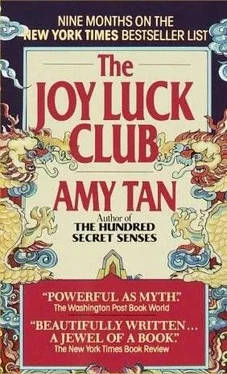When we arrived at the lake, I was disappointed to feel no cooling breezes. Our rickshaw pullers were soaked with sweat and their mouths were open and panting like horses. At the dock, I watched as the old ladies and men started climbing aboard a large boat our family had rented. The boat looked like a floating teahouse, with an open-air pavilion larger than the one in our courtyard. It had many red columns and a peaked tile roof, and behind that what looked like a garden house with round windows.
When it was our turn, Amah grasped my hand tightly and we bounced across the plank. But as soon as my feet touched the deck, I sprang free and, together with Number Two and Number Three, I pushed my way past people's legs enclosed in billows of dark and bright silk clothes-trying to see who would be the first to run the length of the boat.
I loved the unsteady feeling of almost falling one way then another. Red lanterns hanging from the roof and railings swayed, as if pushed by a breeze. My half-sisters and I ran our fingers over benches and small tables in the pavilion. We traced our fingers over the patterns of the ornamental wood railings and poked our faces through openings to see the water below. And then there were more things to find!
I opened a heavy door leading into the garden house and ran past a room that looked like a large sitting area. My sisters followed behind laughing. Through another door, I saw people in a kitchen. A man holding a big cleaver turned and saw us, then called to us, as we shyly smiled and backed away.
At the rear of the boat we saw poor-looking people: a man feeding sticks into a tall chimney stove, a woman chopping vegetables, and two rough-looking boys squatting close to the edge of the boat, holding what looked to be a piece of string attached to a wire-mesh cage lying just below the surface of the water. They gave us not even a glance.
We returned to the front of the boat, just in time to see the dock moving away from us. Mama and the other ladies were already seated on benches around the pavilion, fanning themselves furiously and slapping the sides of each other's heads when mosquitoes lighted. Baba and Uncle were leaning over a rail, talking in deep, serious voices. My brother and some of his boy cousins had found a long bamboo stick and were poking the water as if they could make the boat go faster. The servants were seated in a cluster at the front, heating water for tea, shelling roasted gingko nuts, and emptying out hampers of food for a noonday meal of cold dishes.
Even though Tai Lake is one of the largest in all of China, that day it seemed crowded with boats: rowboats, pedal boats, sailboats, fishing boats, and floating pavilions like ours. So we often passed other people leaning out to trail their hands in the cool water, some drifting by asleep beneath a cloth canopy or oil-coated umbrella.
Suddenly I heard people crying, "Ahh! Ahh! Ahh!" and I thought, At last, the day has begun! I raced to the pavilion and found aunts and uncles laughing as they used chopsticks to pick up dancing shrimp, still squirming in their shells, their tiny legs bristling. So this was what the mesh cage beneath the water had contained, freshwater shrimp, which my father was now dipping into a spicy bean-curd sauce and popping into his mouth with two bites and a swallow.
But the excitement soon waned, and the afternoon seemed to pass like any other at home. The same listlessness after the meal. A little drowsy gossip with hot tea. Amah telling me to lie down on my mat. The quiet as everyone slept through the hottest part of the day.
I sat up and saw Amah was still asleep, lying askew on her sleeping mat. I wandered to the back of the boat. The rough-looking boys were removing a large, squawking long-necked bird from a bamboo cage. The bird had a metal ring around its neck. One boy held onto the bird, wrapping his arms around the bird's wings. The other tied a thick rope to a loop on the metal neck ring. Then they released the bird and it swooped with a flurry of white wings, hovered over the edge of the boat, then sat on top of the shiny water. I walked over to the edge and looked at the bird. He looked back at me warily with one eye. Then the bird dove under the water and disappeared.
One of the boys threw a raft made of hollow reed flutes into the water and then dove in and emerged on top of the raft. In a few seconds, the bird also emerged, its head struggling to hold onto a large fish. The bird jumped onto the raft and then tried to swallow the fish, but of course, with the ring around its neck, it could not. In one motion, the boy on the raft snatched the fish from the bird's mouth and threw it to the other boy on the boat. I clapped my hands and the bird dove under water again.
For the next hour, while Amah and everybody else slept, I watched like a hungry cat waiting its turn, as fish after fish appeared in the bird's beak only to land in a wooden pail on the boat. Then the boy in the water cried to the other, "Enough!" and the boy on the boat shouted to someone high atop the part of the boat I could not see. And loud clanks and hissing sounds erupted as once again the boat began to move. Then the boy next to me dove into the water. Both boys got on the raft and crouched in the middle like two birds perched on a branch. I waved to them, envying their carefree ways, and soon they were far away, a little yellow spot bobbing on the water.
It would have been enough to see this one adventure. But I stayed, as if caught in a good dream. And sure enough, I turned around and a sullen woman was now squatting in front of the bucket of fish. I watched as she took out a sharp, thin knife and began to slice open the fish bellies, pulling out the red slippery insides and throwing them over her shoulder into the lake. I saw her scrape off the fish scales, which flew in the air like shards of glass. And then there were two chickens that no longer gurgled after their heads were chopped off. And a big snapping turtle that stretched out its neck to bite a stick, and-whuck!-off fell its head. And dark masses of thin freshwater eels, swimming furiously in a pot. Then the woman carried everything, without a word, into the kitchen. And there was nothing else to see.
It was not until then, too late, that I saw my new clothes-and the spots of bloods, flecks of fish scales, bits of feather and mud. What a strange mind I had! In my panic, in hearing waking voices toward the front of the boat, I quickly dipped my hands in the bowl of turtle's blood and smeared this on my sleeves, and on the front of my pants and jacket. And this is what I truly thought: that I could cover these spots by painting all my clothes crimson red, and that if I stood perfectly still no one would notice this change.
That is how Amah found me: an apparition covered with blood. I can still hear her voice, screaming in terror, running over to see what pieces of my body were missing, what leaky holes had appeared. And when she found nothing, after inspecting my ears and my nose and counting my fingers, she called me names, using words I had never heard before. But they sounded evil, the way she hurled and spat the words out. She yanked off my jacket, pulled off my pants. She said I smelled like "something evil this" and I looked like "something evil that." Her voice was trembling not so much with anger as with fear. "Your mother, now she will be glad to wash her hands of you," Amah said with great remorse. "She will banish us both to Kunming." And then I was truly frightened, because I had heard that Kunming was so far away nobody ever came to visit, and that it was a wild place surrounded by a stone forest ruled by monkeys. Amah left me crying on the back of the boat, standing in my white cotton undergarments and tiger slippers.
I had truly expected my mother to come soon. I imagined her seeing my soiled clothes, the little flowers she had worked so hard to make. I thought she would come to the back of the boat and scold me in her gentle way. But she did not come. Oh, once I heard some footsteps, but I saw only the faces of my half-sisters pressed to the door window. They looked at me wide-eyed, pointed to me, and then laughed and scampered off.
Читать дальше












